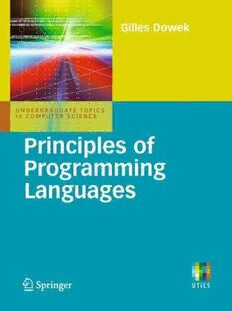
Principles of Programming Languages PDF
166 Pages·2009·9.722 MB·
Most books are stored in the elastic cloud where traffic is expensive. For this reason, we have a limit on daily download.
Preview Principles of Programming Languages
Description:
The development of programming languages has profoundly impacted our relationship with language, complexity and machines. By introducing the principles of programming languages, using the Java language as a support, Gilles Dowek provides the necessary fundamentals of this language as a first objective. It is important to realise that knowledge of a single programming language is not really enough. To be a good programmer, you should be familiar with several languages and be able to learn new ones. In order to do this, you’ll need to understand universal concepts, such as functions or cells, which exist in one form or another in all programming languages. The most effective way to understand these universal concepts is to compare two or more languages. In this book, the author has chosen Caml and C. To understand the principles of programming languages, it is also important to learn how to precisely define the meaning of a program, and tools for doing so are discussed. Finally, there is coverage of basic algorithms for lists and trees.Intended for students with some small experience of computer programming, learned empirically in a single programming language other than Java, students in both computer science and engineering will find this book a very welcome introduction to the principles of programming languages. Written for students this book presents what all scientists and engineers should know about programming languages.
See more
The list of books you might like
Most books are stored in the elastic cloud where traffic is expensive. For this reason, we have a limit on daily download.
